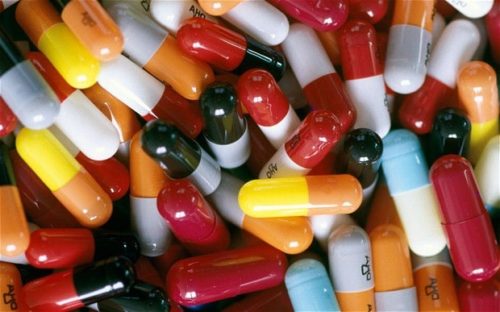Difference Between Steroids and Antibiotics

Antibiotics and steroids are very important drugs in many clinical illnesses. Antibiotics are substances or compounds that terminate bacterial growth or the bacteria themselves. They are used to treat infections caused by microorganisms like fungi and protozoa. Steroids are fat-soluble organic compounds that practically mimic the action of the adrenal glands, the body’s most powerful regulator of general metabolism. Steroids are highly potent in treating inflammatory and allergic conditions. There are functions that steroids can fulfill that antibiotics aren’t capable of, and vice-versa. This is due to a range of differences in structure, properties, and physiological approach to the body.
Steroids can be divided into sex steroids, corticosteroids, and anabolic steroids. All three are used as medical aids in different kinds of illnesses or dysfunction. Sex steroids, testosterones for instance, are widely employed in reproductive regulation like contraception and correction of hormonal imbalances. Anabolic steroids, the most popular type, aid in muscle and bone synthesis and boost strength. Lastly, corticosteroids regulate metabolism, immune function, blood volume, and renal excretion of electrolytes.
Most medical steroids fall under the last category. They are intended for illnesses that involve inflammation in the body like asthma, arthritis, eczema, and even cancers like leukemia. Steroids suppress the body’s ability to exhibit a normal response to foreign stimuli, giving the body a chance to heal itself. Furthermore, is highly recommended to apply steroids directly onto the area that needs treating, for instance by inhalation into the lungs for wheezing, as eye drops for eye inflammation, or as an injection directly into an inflamed joint. Some are ingested as pills or injected into muscles or veins. They also come in forms of eye or nose drops and ‘enema’ to treat bowel conditions. Medical experts are keen on keeping steroid dosages in control; high intake may cause long-term drawbacks. Some of these are eye cataracts and glaucoma, muscle weakness, high blood pressure, weight gain, inhibited growth in children, thinning of bones, skin problems like bruising or acne, and – worst of all – immune system failure.

Antibiotics, on the other hand, are either bactericidal or bacteriostatic in nature. Bactericidal antibiotics target the bacterial cell wall, membrane, or enzymes. Examples of this are penicillin, cephalosporin, quinolone, and sulfonamide. Bacteriostatic antibiotics are those that directly aim for protein synthesis, such as tetracycline and aminoglycoside. As one may notice, both types directly and specifically target the bacteria. For this reason, antibiotics are nicknamed ‘magic bullets’ and have proved to be effective in treatment of any bacterial infection., They are, however, not capable of healing viral, fungal, or other nonbacterial diseases, such as the common cold.
Although antibiotics are prescribed frequently, misuse of these drugs can contribute to the emergence of resistant bacteria that is more difficult, or even impossible, to combat. It is also likely to have a negative effect on the immune system. For instance, during the bacterial attack, some good bacteria are also killed. The most common of these good guys are responsible for the production of B vitamins and lactase, as well as aiding in fighting tumors, lowering high cholesterol levels, and improving digestion. Without these friendly bacteria, the body is more susceptible to other pathogens that can cause immunological, neurological, or endocrinologic problems. This overgrowth of pathogens such as yeast (Candidiasis) has been linked to food allergies, autoimmune disorders, and chemical sensitivities, among others.
Summary
1) Antibiotics and steroids are drugs used o treat a wide range of medical conditions.
2) Antibiotics treat bacterial infections by directly targeting and killing the bacteria. Steroids heal inflammatory and allergic reactions by suppressing the body’s response to foreign stimuli, buying it time to heal itself.
3) Misuse of both types of drugs can lead to adverse side effects, such as deterioration of the immune system.
- Differences Between Fraternity And Sorority - January 8, 2014
- Differences Between Lucite and Plastic - January 7, 2014
- Differences Between Oil and Butter - January 6, 2014
Search DifferenceBetween.net :
8 Comments
Leave a Response
References :
[0]https://commons.wikimedia.org/wiki/File:Press_Release_on_Steroids_(077c)_(7395846634).jpg
[1]http://www.i-am-bored.com/2015/01/first-antibiotic-discovered-in-30-years-pic.html

dear!
i cant understand the diffrence between antibitics vs steriods.
dr hanif NIH islamabad
I am allergic to amoxcillin now for swelling due to allergy doctor has prescribed methyprednisolone tablets (Medrol) .I can take it.please reply immediately.thanks.
Hi there thanks for replying, I found your information very helpful as I also am allergic, but a female I don’t want to put weight on, can you let me know if I did get put on the medication you mentioned Tracy
Very very helpful. My dog had both dry scabby nose and yellows secretions from it. The first vet gave steroids and yes by next day some scabby and wetness had dried up. But then he woke up with the yellow secretions from the nose, so I went another vet for a second opinion who prescribed antibiotics.
On reading this article it has helped, as initially I will continue with the steroids as it did show some improvement within 12 hours, but shall view his nose secretions and make further decisions later. Of course I will not give both at the same time.
Funny how two professionals had different medical views, that why I got a second opinion.
Can you tell me if this dual prescribing is a widespread medical trend or just a local one?
Is there really a good reason for prescribing antibiotics and prednisone together, and am I being foolish not to follow doctor’s orders?
found this info so very informative. thankyou
Antibiotics are the medicines which we take if we are ill or suffering from any time of disease. We take antibiotics to kill the germs and recovers as soon as possible. But on the other hand many peoples take steroids to build their mucsles but in actually steriods are dangeouse for the health so we have to avoid to take steriods.
Hello …. thanks for the article, it has given me a good knowledge about the difference between Antibiotics and steroids, I understand well that antibiotics are to be used for bacterial infections and steroids are to be used for viral and inflammatory infections, it’s also important that we should have a good knowledge but when we take medicine then it should be in the surveillance of a good doctor.
Thanks